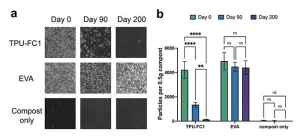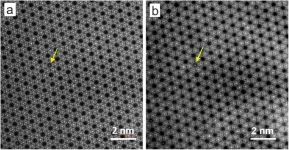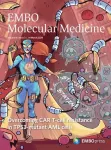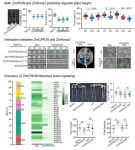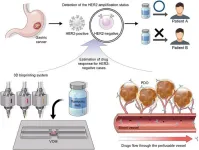(Press-News.org) Microplastics are tiny, nearly indestructible fragments shed from everyday plastic products. As we learn more about microplastics, the news keeps getting worse. Already well-documented in our oceans and soil, we’re now discovering them in the unlikeliest of places: our arteries, lungs and even placentas. Microplastics can take anywhere from 100 to 1,000 years to break down and, in the meantime, our planet and bodies are becoming more polluted with these materials every day.
Finding viable alternatives to traditional petroleum-based plastics and microplastics has never been more important. New research from scientists at the University of California San Diego and materials-science company Algenesis shows that their plant-based polymers biodegrade — even at the microplastic level — in under seven months. The paper, whose authors are all UC San Diego professors, alumni or former research scientists, appears in Nature Scientific Reports.
“We're just starting to understand the implications of microplastics. We've only scratched the surface of knowing the environmental and health impacts,” stated Professor of Chemistry and Biochemistry Michael Burkart, one of the paper’s authors and an Algenesis co-founder. “We're trying to find replacements for materials that already exist, and make sure these replacements will biodegrade at the end of their useful life instead of collecting in the environment. That's not easy.”
“When we first created these algae-based polymers about six years ago, our intention was always that it be completely biodegradable,” said another of the paper’s authors, Robert Pomeroy, who is also a professor of chemistry and biochemistry and an Algenesis co-founder. “We had plenty of data to suggest that our material was disappearing in the compost, but this is the first time we’ve measured it at the microparticle level.”
Putting it to the test
To test its biodegradability, the team ground their product into fine microparticles, and used three different measurement tools to confirm that, when placed in a compost, the material was being digested by microbes.
The first tool was a respirometer. When the microbes break down compost material, they release carbon dioxide (CO2), which the respirometer measures. These results were compared to the breakdown of cellulose, which is considered the industry standard of 100% biodegradability. The plant-based polymer matched the cellulose at almost one hundred percent.
Next the team used water flotation. Since plastics are not water soluble and they float, they can easily be scooped off the surface of water. At intervals of 90 and 200 days, almost 100% of the petroleum-based microplastics were recovered, meaning none of it had biodegraded. On the other hand, after 90 days, only 32% of the algae-based microplastics were recovered, showing that more than two thirds of it had biodegraded. After 200 days, only 3% was recovered indicating that 97% of it had disappeared.
The last measurement involved chemical analysis via gas chromatography/mass spectrometry (GCMS), which detected the presence of the monomers used to make the plastic, indicating that the polymer was being broken to its starting plant materials. Scanning-electron microscopy further showed how microorganisms colonize the biodegradable microplastics during composting.
“This material is the first plastic demonstrated to not create microplastics as we use it,” said Stephen Mayfield, a paper coauthor, School of Biological Sciences professor and co-founder of Algenesis. “This is more than just a sustainable solution for the end-of-product life cycle and our crowded landfills. This is actually plastic that is not going to make us sick.”
Creating an eco-friendly alternative to petroleum-based plastics is only one part of the long road to viability. The ongoing challenge is to be able to use the new material on pre-existing manufacturing equipment that was originally built for traditional plastic, and here Algenesis is making progress. They have partnered with several companies to make products that use the plant-based polymers developed at UC San Diego, including Trelleborg for use in coated fabrics and RhinoShield for use in the production of cell phone cases.
“When we started this work, we were told it was impossible,” stated Burkart. “Now we see a different reality. There's a lot of work to be done, but we want to give people hope. It is possible.”
Full list of authors: Robert S. Pomeroy, Michael D. Burkart, Steven P. Mayfield (all UC San Diego), Marco N. Allemann, Marissa Tessman, Jaysen Reindel, Gordon B. Scofield, Payton Evans, Ryan Simkovsky (all Algenesis).
This research was supported by funding from the Department of Energy (DE-SC0019986 and DE-EE0009295).
Disclosure: Burkart, Mayfield and Pomeroy are co-founders of and hold equity positions in Algenesis Corporation.
END
Say hello to biodegradable microplastics
Research shows plant-based polymers can disappear within seven months
2024-03-21
ELSE PRESS RELEASES FROM THIS DATE:
New method for analyzing nanoporous materials
2024-03-21
In addition to their main components, the properties of crystalline and nanoporous materials often depend crucially on guest atoms or ions that are embedded in the tiny pores of their lattice structure. This applies to high-tech materials used in sensor or separation technology as well as to natural materials. The bluish gemstone aquamarine, for example, would be colourless without such guest components. Determining the type and position of guest components is difficult, as many materials react sensitively to the radiation emissions ...
An immunotherapy to overcome resistant leukemia
2024-03-21
Acute myeloid leukemia (AML) is an aggressive form of blood cancer. It is caused by mutations in a large number of genes that are acquired in the course of a person’s life. One of these genes – the tumor suppressor gene TP53 – plays a key role. Normally, TP53 helps to prevent the development of tumors. Blood cancer patients in whom this gene is mutated, however, face an extremely poor prognosis, as their genes are resistant to conventional chemotherapeutic agents. Intensive research is therefore being carried out into new therapeutic approaches, ...
The irony of smoking to stay thin: smoking increases belly fat
2024-03-21
The worry of gaining weight is a common excuse for smokers not to quit. A new study published today in the scientific journal Addiction has found that both starting smoking and lifetime smoking may increase abdominal fat, especially visceral fat: the unhealthy fat deep inside the abdomen that is linked to a higher risk of heart disease, diabetes, stroke, and dementia.
Smokers tend to have lower body weights than non-smokers, but they also have more abdominal fat, and more abdominal visceral fat. Visceral fat is hard to see; you can have ...
Healing eyes with contact lenses
2024-03-21
A cross-disciplinary University of Waterloo team has developed a new contact lens material that could act as a bandage for corneal wounds while releasing drugs in a controlled manner to help the eye heal faster.
Typically, corneal abrasion patients spend seven to 10 days wearing a clear, oxygen-permeable bandage contact lens, often instilled with eyedrops containing antibiotics. However, the one-time antibiotic application makes it difficult to ensure enough drugs stay on the eye for sustained treatment.
“It’s a targeted-release drug delivery ...
Excess temperatures cause low flocking concerns
2024-03-21
High temperatures during critical periods of the reproductive cycle of sheep result in 2.1 million fewer lambs produced in Australia each year, costing sheep farmers an estimated $97 million annually.
The work, funded by Meat and Livestock Australia and conducted by a transdisciplinary team of researchers from the University of Adelaide and South Australian Research Development Institute (SARDI), found that days above 32°C during the week of mating caused the significant loss of potential lambs.
Published in Nature Food, the study found annual losses of potential lambs would increase to 2.5 million if median global warming increased ...
The maize ZmCPK39-ZmKnox2 module regulates plant height
2024-03-21
This study was led by Professor Mingliang Xu (College of Agronomy and Biotechnology, China Agricultural University, Beijing, China). Through phylogenic analysis, the authors identified a gene encoding a calcium-dependent protein kinase, ZmCPK39, as a candidate gene for plant height regulation in maize. The function of ZmCPK39 in controlling plant height has been verified using gene editing technology. Compared to the wild-type ND101, knockout of ZmCPK39 significantly reduced plant height by 40%.
The authors further ...
New route to recyclable polymers from plants
2024-03-21
Cellulose, abundantly available from plant biomass, can be converted into molecules used to make a new class of recyclable polymers, to sustainably replace some plastics.
Researchers at Hokkaido University have taken a significant step forward in the drive to make recyclable yet stable plastics from plant materials. This is a key requirement to reduce the burden of plastic pollution in the environment. They developed a convenient and versatile method to make a variety of polymers from chemicals derived from plant cellulose; crucially, these polymers can be fully recycled. The method was published in the journal ACS Macro Letters.
Cellulose is one of the most abundant ...
Revolutionizing gastric cancer treatment through personalized 3D bioprinting
2024-03-21
Gastric cancer ranks among the most widespread diseases in Asian populations, with South Koreans experiencing the third-highest incidence globally in 2020, as reported by the International Agency for Research on Cancer. Recently, a collaborative research effort between Pohang University of Science and Technology (POSTECH) and Yonsei University achieved advancement in the realm of precision personalized medicine for gastric cancer. By using 3D bioprinting to accurately replicate the biological environment surrounding gastric cancer cells, the researchers have achieved a significant ...
How neural inhibition could reduce alcohol use
2024-03-21
LA JOLLA, CA—Neuroscientists at Scripps Research have found that inhibiting neurons involved in the body’s stress response may reduce alcohol consumption in people who have both post-traumatic stress disorder (PTSD) and alcohol use disorder (AUD)—even if they still experience trauma-related anxiety.
The findings were published March 21 in Molecular Psychiatry. These discoveries are helping untangle the complex role that stress and trauma play in neurological disorders like PTSD and AUD, while also informing the development of new treatment options for people who experience both these conditions simultaneously.
“Traumatic ...
The Lancet: Dramatic declines in global fertility rates set to transform global population patterns by 2100
2024-03-21
Embargoed access to the paper and contact details for authors are available in Notes to Editors at the end of the release.
By 2050, over three-quarters (155 of 204) of countries will not have high enough fertility rates to sustain population size over time; this will increase to 97% of countries (198 of 204) by 2100.
Pronounced shifts in patterns of livebirths are also predicted, with the share of the world’s live births nearly doubling in low-income regions from 18% in 2021 to 35% in 2100; and sub-Saharan Africa accounting for one in every two children born on the planet by 2100.
In low-income settings with higher fertility rates, better access to contraceptives and female education ...
LAST 30 PRESS RELEASES:
Asteroid samples offer new insights into conditions when the solar system formed
Fecal transplants from older mice significantly improve ovarian function and fertility in younger mice
Delight for diastereomer production: A novel strategy for organic chemistry
Permafrost is key to carbon storage. That makes northern wildfires even more dangerous
Hairdressers could be a secret weapon in tackling climate change, new research finds
Genetic risk for mental illness is far less disorder-specific than clinicians have assumed, massive Swedish study reveals
A therapeutic target that would curb the spread of coronaviruses has been identified
Modern twist on wildfire management methods found also to have a bonus feature that protects water supplies
AI enables defect-aware prediction of metal 3D-printed part quality
Miniscule fossil discovery reveals fresh clues into the evolution of the earliest-known relative of all primates
World Water Day 2026: Applied Microbiology International to hold Gender Equality and Water webinar
The unprecedented transformation in energy: The Third Energy Revolution toward carbon neutrality
Building on the far side: AI analysis suggests sturdier foundation for future lunar bases
Far-field superresolution imaging via k-space superoscillation
10 Years, 70% shift: Wastewater upgrades quietly transform river microbiomes
Why does chronic back pain make everyday sounds feel harsher? Brain imaging study points to a treatable cause
Video messaging effectiveness depends on quality of streaming experience, research shows
Introducing the “bloom” cycle, or why plants are not stupid
The Lancet Oncology: Breast cancer remains the most common cancer among women worldwide, with annual cases expected to reach over 3.5 million by 2050
Improve education and transitional support for autistic people to prevent death by suicide, say experts
GLP-1 drugs like Ozempic could cut risk of major heart complications after heart attack, study finds
Study finds Earth may have twice as many vertebrate species as previously thought
NYU Langone orthopedic surgeons present latest clinical findings and research at AAOS 2026
New journal highlights how artificial intelligence can help solve global environmental crises
Study identifies three diverging global AI pathways shaping the future of technology and governance
Machine learning advances non targeted detection of environmental pollutants
ACP advises all adults 75 or older get a protein subunit RSV vaccine
New study finds earliest evidence of big land predators hunting plant-eaters
Newer groundwater associated with higher risk of Parkinson’s disease
New study identifies growth hormone receptor as possible target to improve lung cancer treatment
[Press-News.org] Say hello to biodegradable microplasticsResearch shows plant-based polymers can disappear within seven months
